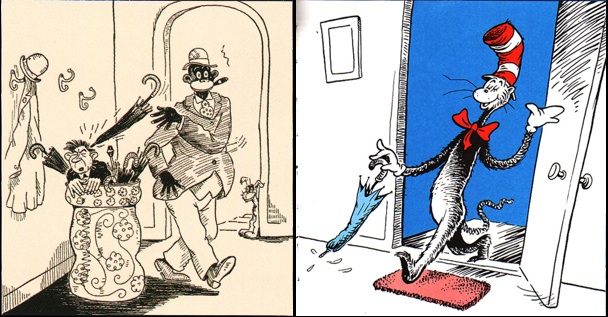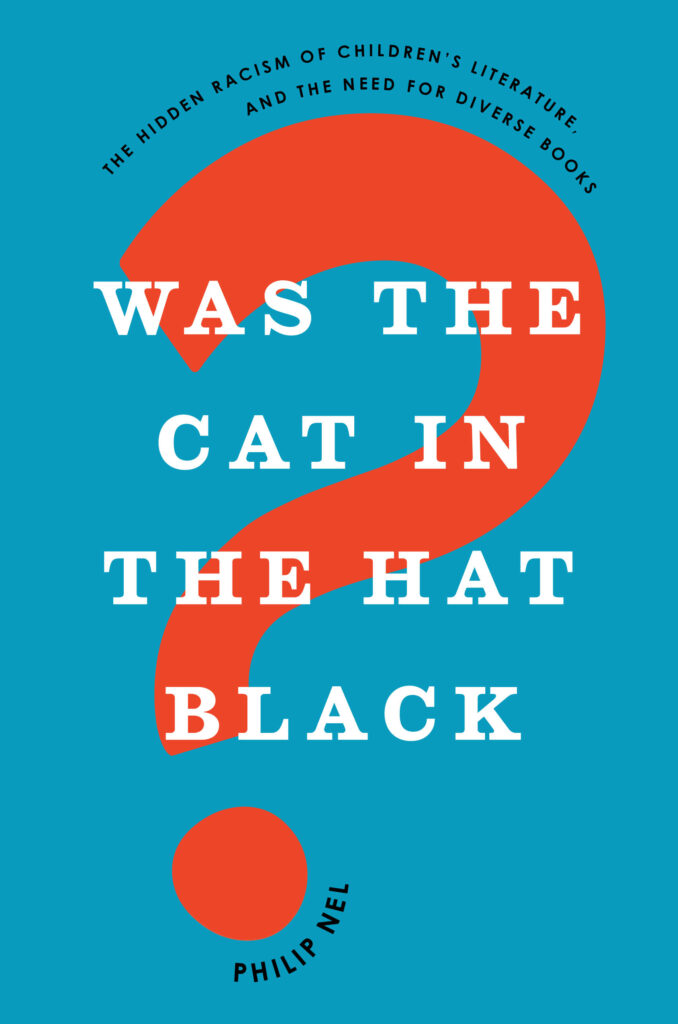
As we reconsider the works of Dr. Seuss on what would have been his (well, Theodor Seuss Geisel’s) 115th birthday, I encourage you to take a look at Katie Ishizuka and Ramón Stephens’ “The Cat is Out of the Bag: Orientalism, Anti-Blackness, and White Supremacy in Dr. Seuss’s Children’s Books,” just published in Research on Diversity in Youth Literature last month. To give you a sense of the article’s impact, it has been downloaded over 18,000 times (as of this writing) and is mentioned in an NPR story.
I don’t have anything further to add, having written quite a bit on Seuss – including the influence of blackface minstrelsy on the Cat in the Hat. You can find that in the title chapter of Was the Cat in the Hat Black?: The Hidden Racism of Children’s Literature and the Need for Diverse Books (2017), which will be out in paperback on the 29th of this month. The paperback includes a new Afterword on “Why Adults Refuse to Admit Racist Content in the Children’s Books They Love” – in which I read some of the hate mail that the hardcover inspired, with the goal of educating people who are reluctant to reflect on their “problematic faves” from childhood.

Posts related to Was the Cat in the Hat Black?, including glimpses of the work in progress:
- Context, Privilege, and Pain (26 Nov. 2018)
- What to do with Dr. Seuss? (2 March 2018)
- Was the Cat in the Hat Black? (Talks @ Google) (25 Sept. 2017)
- 7 Questions We Should Ask About Children’s Literature (19 Sept. 2017)
- Free Book: Goodreads Giveaway of Was the Cat in the Hat Black? (1 Sept. 2017)
- Racism & Seuss: It’s not a bug. It’s a feature. (A Twitter Essay) (12 Aug. 2017)
- Was the Cat in the Hat Black? – cover reveal (19 Dec. 2016).
- Was the Cat in the Hat Black?: The Hidden Racism of Children’s Literature, and Why We Need Diverse Books (4 Dec. 2015). The announcement of the book’s publication. It inspired a response from Debbie Reese, which in turn prompted me to change the title. Upon learning that “We Need Diverse Books” is trademarked (by the excellent We Need Diverse Books organization), I changed “Why We Need Diverse Books” to “the Need for Diverse Books.”
- The Archive of Childhood, Part 2: The Golliwog (13 Jan. 2015). A revised version of this blog post appears as part of the book’s introduction (“Race, Racism, and the Cultures of Childhood”).
- Was the Cat in the Hat Black? (22 June 2014). An earlier version of the title chapter (“The Strange Career of the Cat in the Hat; or, Dr. Seuss’s Racial Imagination”) appeared as an article, in Children’s Literature 42 (2014).
- On Reading the Expurgated Huck Finn; or, Why We Should Teach Offensive Novels (17 Oct. 2014). I wrote this blog post so that I could write about Alan Gribben’s expurgated edition of Twain. Pieces of this appear (in revised form) in Chapter 2, “How to Read Uncomfortably: Racism, Affect, and Classic Children’s Books.”
- Can Censoring a Children’s Book Remove Its Prejudices? (19 Sept. 2010). My earliest thinking on what became Chapter 2 (“How to Read Uncomfortably”), and one of the most frequently cited posts from this blog. I hope that – in future – people cite the book chapter… because it’s better!
- “The Boundaries of Imagination”; or, the All-White World of Children’s Books, 2014 (17 March 2014). On the occasion of the New York Times pieces by Christopher Myers and Walter Dean Myers, a collection of information and essays about the fight for diversity in children’s literature.
- Disagreement, Difference, Diversity: A Talk by Christopher Myers (24 Oct. 2015). A few thoughts and notes on an excellent talk by Christopher Myers. I quote from his talk in the book.
- Regarding the Pain of Racism (4 Apr. 2015). Reflections on an observation by Naomi Murakawa, and on my challenges as a White male scholar writing about oppressions I have not experienced. A few slivers of this appear in the Conclusion, “A Manifesto for Anti-Racist Children’s Literature.”
- Ferguson: Response & Resources (24 Aug. 2014). I began this book before the Black Lives Matter movement began, but it and its leaders have informed my work.
- #BlackLivesMatter – A Twitter Essay (3 Dec. 2014). Daniel Pantaleo is on video choking Eric Garner to death. When a grand jury said there was no need for a trial, I wrote this.
- Again. And Again. And… ENOUGH! (7 July 2016). The murders of Alton Sterling and Philando Castile inspired this. #BlackLivesMatter
- Charleston, Family History, and White Responsibility (22 June 2016). A response to the terrorism in Charleston, South Carolina. Following sustained critique from family members, I removed this from the blog – the first time that I’ve altered a post for reasons other than finding an error or a typo. However, the Wayback Machine preserved the post. Ideas expressed in it emerge in the book (notably, the end of Chapter 3), but (unlike the original post) do so without identifying specific individuals.
Some previous posts on Seuss
- Seuss’s Matilda: Horton’s Ancestor (2 Mar. 2017)
- How Do We Stop the Trump on the Stump? The Truth Is in Seuss! (28 March 2016). From my ears to the American electorate. (Results of the warning were, um, mixed. At best.)
- Seuss on Film (2 March 2016). Includes four clips of Seuss: Unusual Occupations (1940), Making SNAFU (c. 1943), To Tell the Truth (1958), and footage from a New Zealand schoolroom (1964).
- No Seuss Better Than Faux Seuss (27 July 2015). On bad imitation Seuss verse, contrasted with good imitation – provided via audio of David Rakoff’s excellent “Samsa and Seuss.”
- Six Spots of Seuss News (2 Mar. 2015). On What Pet Should I Get?, Elana Kagan’s citation of One fish two fish red fish blue fish (1960) in a 2015 Supreme Court decision written by Justice Elena Kagan, Dr. Seuss advertising art from 1936, and a Dr. Seuss rap quiz!
- Oh, the Quotations You’ll Forge! (2 Mar. 2014). Seuss’s pithy verse is very quotable. Unfortunately, people have a habit of attributing things to him that he never said. This post exposes some fake Seuss, and gives you plenty of quotations that he actually did say.
- Happy birthday to Dr. Seuss! A guest post by Charles D. Cohen (2 Mar. 2013). Birthday reflections from Seussologist Charles Cohen (The Seuss, the Whole Seuss, and Nothing But the Seuss). Quotes some original verse by Seuss, including “Pentellic Bilge for Bennett Cerf’s Birthday” (1940).
- How to Mispronounce “Dr. Seuss” (6 Feb. 2013). Also: how to pronounce “Dr. Seuss.”
- I Am the Lorax. I Speak for the Theeds? (3 Mar. 2012). Some thoughts on The Lorax film and its attendant advertising.
- Dr. Seuss: children’s books “have a greater potential for good or evil, than any other form of literature on earth.” (1 Mar. 2012). A 1960 essay by Seuss on writing for children.
- Dr. Seuss on “conditioned laughter,” racist humor, and why adults are “obsolete children” (16 Jan. 2012). A 1952 essay by Seuss on humor.
- Seussology (15 Jan. 2012): On my graduate-level “Dr. Seuss” course.
- Oh, the Thinks That He Thought! Some of Seuss’s Lesser-Known Works (2 Mar. 2011): My post for Dr. Seuss’s birthday in 2011.
- You’re a Mean One, Mr. Grinch (20 Dec. 2010): 15 versions of the song.
- Corporate Seuss; or, Oh, the Things You Can Sell! (21 Aug. 2010). Ted Geisel was first famous for advertising, not children’s books.

Emily Schneider
Philip Nel
Don Reynolds
CatOlympus